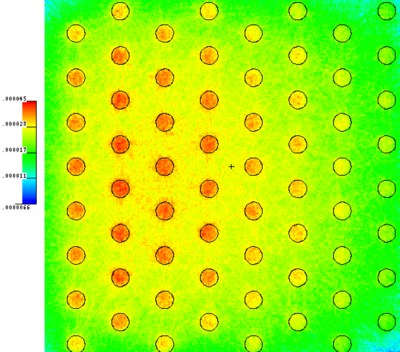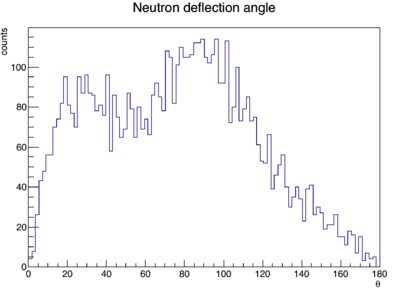Difference between revisions of "Neutron pinball"
| Line 1: | Line 1: | ||
==The Simulation== | ==The Simulation== | ||
| − | Photons with a Bremsstrahlung energy distribution are incident upon 64 thorium cylinders | + | Photons with a Bremsstrahlung energy distribution are incident upon 64 thorium cylinders with a dia. of 0.4 cm and a height of 8 cm, each with 1 cm center-to-center spacing (see the neutron flux plot below). Photofission neutrons were simulated using the MCNPX ACE model. Upon the creation of a neutron, its initial direction of travel is logged and compared with its direction of travel once it leaves the simulation area. The target is surrounded by a cylindrical volume of air with a radius of 150cm and a height equal to the vertical extent of the detectors (76cm). |
[[File:Neutronflux.png|400 px|thumb|center|Prompt neutron flux from photofission in thorium cylinders. Photons are traveling from left to right.]] | [[File:Neutronflux.png|400 px|thumb|center|Prompt neutron flux from photofission in thorium cylinders. Photons are traveling from left to right.]] | ||
Revision as of 00:26, 30 January 2016
The Simulation
Photons with a Bremsstrahlung energy distribution are incident upon 64 thorium cylinders with a dia. of 0.4 cm and a height of 8 cm, each with 1 cm center-to-center spacing (see the neutron flux plot below). Photofission neutrons were simulated using the MCNPX ACE model. Upon the creation of a neutron, its initial direction of travel is logged and compared with its direction of travel once it leaves the simulation area. The target is surrounded by a cylindrical volume of air with a radius of 150cm and a height equal to the vertical extent of the detectors (76cm).
Results
14.5% of neutrons scattered in the thorium cylinders alone, and 16.5% scattered when air was included. The histogram below shows that if a neutron did scatter, it most likely did so at an unacceptable angle.
Go back Elastic scattering

